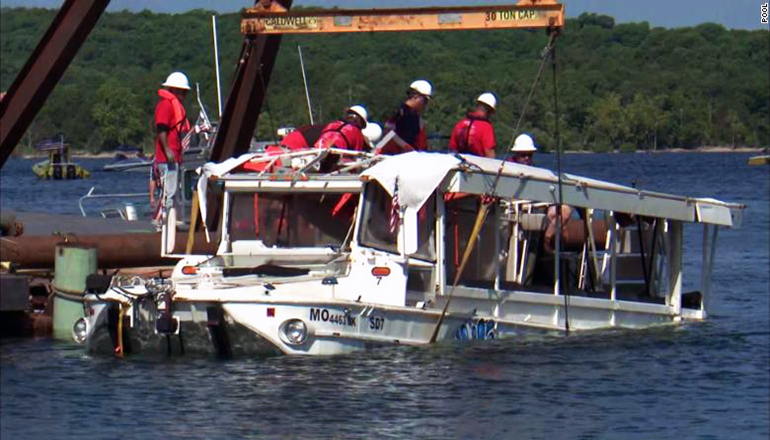The captain of the duck boat that sank at Table Rock Lake last summer, resulting in the deaths of 17 people, was indicted by a federal grand jury.
“Our entire community was shocked and saddened by the loss of 17 lives in this tragic event last summer,” U.S. Attorney Tim Garrison said. “Today’s indictment alleges that the misconduct, negligence, and inattention to duty by the ship’s captain caused or contributed to the loss of those lives.
“This remains an active and ongoing investigation,” Garrison added. “To better enable our office in its urgent pursuit of justice through this investigation, we have requested various courts presiding over the related civil lawsuits to allow our intervention and stay certain manners of discovery to prohibit those lawsuits from impeding or jeopardizing our work. Today’s indictment illustrates the urgency our investigative team has shown in its pursuit so as not to unnecessarily burden other legal avenues utilized by victims.”
Kenneth Scott McKee, 51, of Verona, Mo., was charged in a 17-count indictment returned by a federal grand jury in Springfield, Mo. McKee was the captain of Stretch Duck 7, operated by Ripley Entertainment, Inc. The company operated duck boat tours in Branson, Mo., and on Table Rock Lake and Lake Taneycomo.
The indictment charges McKee with misconduct, negligence, or inattention to duty by a ship’s officer, resulting in the death of another person. McKee is charged with one count for each of the 17 passengers (including one crew member) who died when Stretch Duck 7 sank on July 19, 2018.
The federal indictment alleges that McKee committed a number of acts of misconduct, negligence, and inattention to his duties while piloting Stretch Duck 7 both before and during severe weather conditions.
McKee allegedly failed to properly assess incoming weather prior to entering the vessel on the water. At the time McKee drove the vessel into the water, according to the indictment, there was lightning in the area and severe weather approaching. The indictment also alleges that McKee failed to properly assess the nature of the severe weather while the vessel was on the water.
McKee allegedly operated Stretch Duck 7 in violation of the conditions and limitations specified in the vessels’ certificate of inspection. When severe weather (including increased wind speed) arrived at the vessel’s location, the indictment says, McKee failed to instruct passengers to don personal flotation devices. He allegedly also failed to immediately increase speed and head to the nearest shore. He allegedly caused or allowed the vessel’s plastic side curtains to be lowered, which created a barrier over the vessel’s exits in the event of a need to abandon ship.
The first time the vessel’s bilge alarm sounded, the indictment says, McKee failed to raise the side curtains, failed to instruct passengers to don personal flotation devices, and failed to prepare to abandon ship. The second time the vessel’s bilge alarm sounded, the indictment says, McKee again failed to raise the side curtains, failed to instruct passengers to don personal flotation devices, and failed to prepare to abandon ship. McKee allegedly failed to prepare to abandon ship when there was an unacceptable loss of freeboard on the vessel as well. (Freeboard refers to the distance from the waterline to the upper deck level; a loss of freeboard is when waves are overtopping the freeboard, thus causing the ship to fill with water.)
The indictment alleges that these acts of misconduct, negligence, and inattention to duty separately and collectively caused the lives of 17 persons on board Stretch Duck 7 to be lost.
Under federal statutes, a conviction for this offense is subject to a sentence of up to 10 years in federal prison without parole on each count of conviction, plus a fine of $250,000. The maximum statutory sentence is prescribed by Congress and is provided here for informational purposes, as the sentencing of any convicted defendant is determined by the court based on the advisory sentencing guidelines and other statutory factors.






